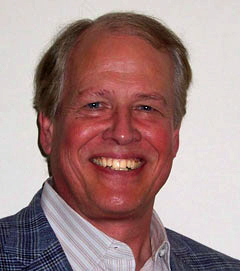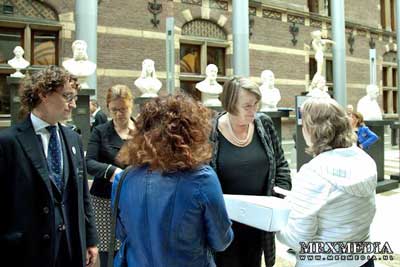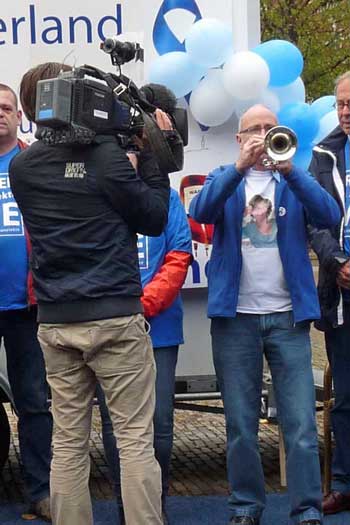

(Dr. Peterson speaks to the Swedish Parliament and years of effort in Holland culminate in the delivery of a petition to have ME/CFS be considered and treated as a biomedical disease in blogs by Anne Ortegren and Esme de Groot.)
Dr Peterson in Sweden
by Anne Ortegren

Dr. Peterson made his way to his ‘second home country’ to meet with Parliament and talk with doctors, researchers and patients
Dr Peterson and Gunnar Gottschalk visited Sweden Oct 14-17, 2013
Dr Peterson regularly visits Sweden – a fact that is much appreciated by the Swedish ME/CFS patient community – as well as by Dr Peterson’s Swedish research colleagues. Dr Peterson has given numerous presentations at ME/CFS conferences in what has become his “second home country”. (See video’s here:
- 2008: http://vimeo.com/1634596,
- 2001: Part 1 http://vimeo.com/30430680, Part II: http://vimeo.com/30432402, Part 3: http://vimeo.com/30565606, Part 4: http://vimeo.com/30567445)
Dr Peterson and his research assistant Gunnar Gottschalk’s intense schedule this time included a full-day research roundtable meeting in Stockholm, a seminar in the Swedish parliament and a meeting in Gothenburg.
Research Roundtable in Stockholm, Oct 15
On Oct 15th, Dr Peterson and Mr Gottschalk participated in a day-long roundtable meeting with 15 Swedish researchers and physicians including Prof Jonas Blomberg (Clinical Microbiology, Uppsala University); Prof Jonas Bergquist (Analytical Chemistry and Neurochemistry, Uppsala University – co-author of the Schutzer protein profile study); Jakob Theorell (Center for Infectious Medicine, Karolinska Institutet), Linda Tannenbaum, Open Medicine Institute (link), and representatives from the Swedish National Society for ME Patients RME (www.rme.nu)
Among the topics of discussion were NK cell functioning, the role of infectious triggers, the possible autoimmune component, methods of diagnosis, biomarkers, treatments (for example the possibilities of Rituximab) and the need for biobanks.
Priorities Determined
A National Swedish Centre of Excellence for the diagnosis and care for ME/CFS patients and a Swedish Rituximab study were given high priority. There was also agreement on the need for double blinded clinical studies on the effects of B12 injections, and talks began on producing one. (Check out the OMI’s crowdfunding effort to fund a large trial involving Dr. Peterson of Simmaron, Dr. Kogelnik of the OMI and the Gottfries Clinic in Sweden.)
In the future smaller network meetings in Sweden will be held a few times a year, and a new large roundtable meeting, facilitated by the Swedish patient organization RME, is planned for 2014.
Many discussions of collaborations on an individual level also took place between the researchers.
Seminar in the Swedish parliament
On Oct 16, a seminar organized by politicians from six parties in collaboration with RME on ME/CFS was held in the Swedish parliament. The venue was full with around 55 people attending including national politicians, regional politicians (in charge of the health care in Sweden), civil servants, representatives of the National Board of Health and Welfare and the Social Insurance Agency, researchers and physicians.
Dr Peterson held the first presentation, entitled “What is ME/CFS? – History and research”. The event was filmed and you can watch Dr Peterson’s presentation here
What is ME/CFS? History and Research
Following Dr Peterson’s talk, Dr Olof Zachrisson from the Swedish Gottfries Clinic spoke about management and treatment. Patient Pernilla Zethraeus gave a moving presentation of the situation many patients in Sweden face.
A panel of six politicians then discussed possible future action, and agreed that measures need to be taken, such as establishment of national centres of excellence. The politician made it clear that it is possible for the Swedish parliament to set aside money earmarked for care/research for a certain disease. (This is unusual in Sweden, but can be done. It rarely happens in the United States.) The politicians expressed a wish for continued dialogue with RME about ways of improving ME/CFS care and research.
For those of you speaking Swedish (?!), there are links to webcasts of the entire seminar here:
http://rme.nu/seminarium-om-mecfs-i-sveriges-riksdag-16-oktober-2013

Talking before the Swedish Parliament, Dr. Peterson acknowledged the progress that’s been made in the last ten years in Sweden.
News piece on ME/CFS on major Swedish TV network
A very good news piece was run by the major Swedish TV network on Oct 16, which included interviews with patient and former politician Pernilla Zethraeus and physicians Olof Zachrisson and Ewa Milerad.
“40.000 patients, but hardly any access to adequate health care”
http://www.svt.se/nyheter/sverige/40-000-drabbade-men-fa-far-vard
Seminar in Gothenburg
On Oct 17, Dr Peterson left the Stockholm, the capital on the East coast of Sweden, for the country’s second largest city, Gothenburg on the West coast, where he spoke at a seminar arranged by the local RME group, RME Väst.
Swedish ME/CFS patients and researchers thank Dr Peterson and Mr Gottschalk for taking time to lend their expertise and experience to the small but expanding ME/CFS field in Sweden. We hope the future will hold much collaboration between Simmaron Research and Swedish researchers and clinicians – as well continued dialogue with Swedish politicians and patients.
The Dutch on the March
by Esme De Groot
Dutch Patients Raise 54.000 Signatures for Recognition of ME as an Neuro-immune Disease
On October 29th a group of Dutch ME patients handed over 54,000 signatures to representatives of the parliament of the Netherlands.This was far more than the needed 40,000 signatures for the submission of a citizens’ initiative.
In the Netherlands parliament has to discuss a subject when it is the wish of more than 40,000 citizens, confirmed by their signatures. With this initiative the government is asked to recognize the disease Myalgic Encephalomyelitis (ME) as a debilitating biomedical disease.
The petition was initiated by Groep ME-Den Haag (Group ME The Hague, The Hague being the seat of Dutch parliament), a group founded for the occasion and consisting of ten home- and bedbound ME patients. Two years ago they started collecting signatures. A lot of volunteers have contributed to get the required number of signatures of at least 40,000.
Many Dutch celebrities and politicians have signed the petition. Foreign ME experts, such as Prof. dr. A. Komaroff (Harvard), Prof. dr. L. Jason (DePaul University) and Prof. dr. M. Lerner (Wayne State University), have supported the initiative by adhesion statements. Also the three largest Dutch patient organizations (ME/CVS Foundation Netherlands, ME/cvs Association and the Support group ME and disability) have declared to support this initiative.
Groep ME-Den Haag is hoping to convince politicians and the medical field with this initiative that something has to change urgently. Currently ME-patients often don’t receive a proper diagnosis and appropriate care. They also need to fight for financial support, useful medical devices (like wheelchairs) and home care.
In the Netherlands, like in other countries, ME is still seen as a psychosomatic disease and treated likewise, with Cognitive Behavioral Therapy (CBT) and gradual exercise therapy.
In the petition the Dutch parliament is asked to recognize ME and to register ME as a biomedical neuro-immune disease. Moreover the Groep ME Den Haag requests that the diagnosis and treatment of this disease to be done in accordance with the International Consensus Criteria for ME (ICC-Carruthers et all, 2011), which has been drafted by a large group of international ME-experts.
The petition also asks for more biomedical research into the causes of ME, the compiling of an insurance protocol for ME based on the ICC, and educating and training physicians based on the current, international knowledge.
While members of Groep ME-Den Haag were handing over the boxes with signatures and a package with information for the Commission of Health, outside the parliament there a group of patients and supporters demonstrated. After the members of the group joined the demonstration a minute of silence was held for bedridden patients at home and patients who died of the disease. At the end the group was thanked for their extraordinary accomplishment.
A commercial TV station filmed the event for a news program and they also filmed two patients at home.
Photo’s: Martin Reschad – MRX MEDIA/http://mrxmedia.nl/









I’m thrilled to hear news from these other countries. in particular, the Netherlands. I’ve a friend there via the net who I’m certain you know well or know of, Jan van Roijen.
He’s been very ill at times, but he always puts out newsletters via email and has been an activist and voice as long as I can remember.
(That would be dating back to when I first was diagnosed; late in 2002
by Dr Derek Enlander in New York).
I am praying treatment in the Netherlands will improve for Jan and so many others!
Thanks so much for this story, Cort!!
Jane Millerick
New York, NY
Wouldn’t it be nice if in the USA a certain number of signatures meant so much recognition and change from our government! I wonder what it would actually take, they did it with AIDS.
But then they could get out of their homes and people were clearly infectious. We need a Gandhi.
Greg
There is a process to do bring something to President Obamas attention, I think, but it requires an enormous number of signatures gathered within a certain time period. It doesn’t seem reachable here.
you would first have to find out, Court. If you don’t take the first step, you’ll be sure to get nowhere in this respect. The Group here started in the fall of 2011 and hoped to get to the required nr. on May 2013, but it took several months longer. So here the time limit wasn’t an issue.
Then it has been an excellent occasion to:
a. invoke consciousness amongst the population about the existence and severetity of ME
b. combining all forces of almost everybody – patients and advocates – towards one and the same goal. The first result was already there, the three main organizations in Holland protesting in a combined effort against an insurance company that didn’t want to prolongue its contract with the Dutch cardiologist Frans Visser, who’s giving webinars in the project Science to patients, as you’re aware of.
I estimate this hadn’t been possible without the unity the pathway of the petititon has paved in our country. And it will go on.
Wow! I love this story. Thanks so much for bringing it to us, Cort.
Way to go Groep ME-Den Haag!!! Standing ovation!
Now if we only had someone who could march to the sea….
This was moving. Best ever summary of the disease, its impact, the politics surrounding it. I can never properly thank those who work tirelessly to help this patient population. Dr. Peterson’s presentation was incredibly validating.
It sounds like they are making headway in Sweden 🙂
Expectations among ME patients that the petition will change anything in The Netherlands are low, according to our survey.
After our last petion of 2009, things only got worse. The politicians tend to be all sympathetic, but then give priority to other issues and forget about us.
We are not holding our breath, therefore, and continue our work on a multidisciplinary guideline for ME. The draft version is due next year.
Best regards,
Guido den Broeder
Chairman of the ME Vereniging Nederland
Keep going! I think it takes time for momentum to build and old ideas to be changed. Good luck!
Fortunately this was an action from and for all Dutch ME patiënts.
It was the first official petition for ME in The HAque ever.
Together we’re strong!
Best regards,
Mirande de Rijke
@ Jane, unfortunately Jan isn’t feeling very well this year. It pains him he can only scarcely mail his beautiful bulletins from his HelpMECircle-initiative.
And as for the petition: 54.000 Dutch citizens agreed that the situation for sufferers from ME isn’t accepable anymore, which is building up consciousness about the disease. Moreover the follow-up is closely watched, a.o. by a lawyer and actions are being planned to remind the government they have an obligation at stake.
Professor M. Houghton may have found a useful biomarker. Cort can you try to find out what that might be?
http://solvecfs.org/wp-content/uploads/2013/06/SolveCFS_Winter2013_FINALsmall.pdf
Thank you for helping us giving us attention!!
I have a concern about the B12 trial. It is a very good idea to conduct a trail, but of what and under what conditions?
1. There are a number of versions of B12.
2. The conditions in which it is stored and used are very important
3.The effectiveness in not necessarilly consistent, it can be very useful indeed but the effects will wax and wan.
A well conducted study needs to consider all these. it would be a shame if a treatment which is frequently very useful indeed was dismissed because the results were variable and the storage of treatment material was poor.Yet I have found that these issues are rarely considered in discussions of the usefulness of B12. Even by the remarkable, patient friendly, Martin Pall.
For example a patient in my family usually derives great benefit from frequent self administered B12 injections. Her doctor figures that there is no more risk in such self administration than the use of insulin by diabetics. She determines the amount and frequency on the basis of her felt need and symptoms.
But the doctor gets the vitamin frozen from the manufacturer, keeps it frozen and provides it still frozen. It is kept in the freezer and if the patient is travelling they keep it in a thermos flask. This is because it is a highly volatile substance and easily degraded by both light and heat.
Yet I hear of great variability in the dosage, storage, and even substance used and little understanding that what my help at one time may not work so well at other times.
When the trial protocol is standardised these issues need to be standardised towards the MOST careful, not the least careful appllication.
Great story Cort!
Hi Mike!